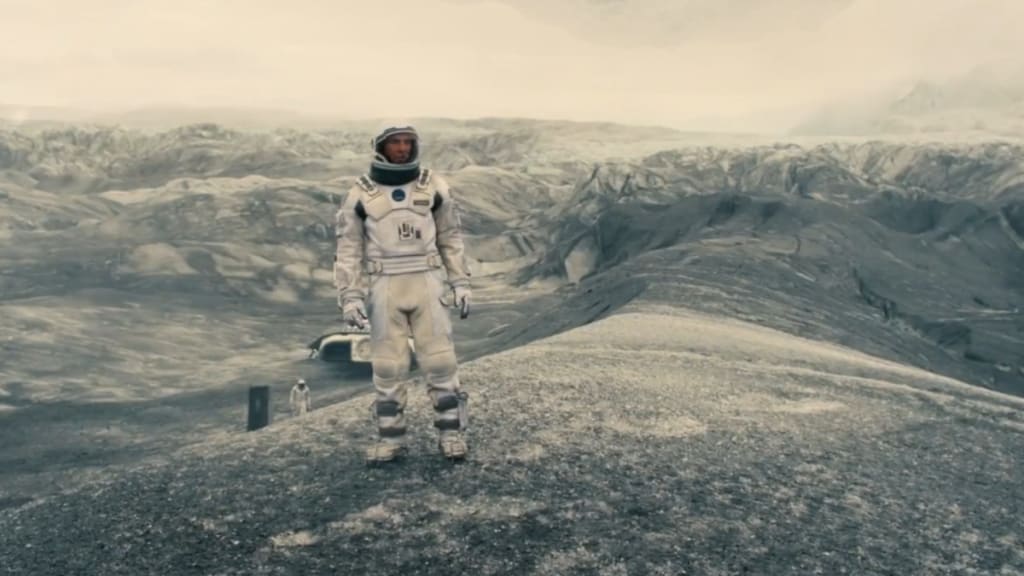
Christopher Nolan's "Interstellar" is a monumental cinematic journey that transcends the boundaries of traditional science fiction, offering audiences an immersive exploration of time, space, and the indomitable human spirit. From its visually stunning landscapes to its intricate narrative, the film stands as a modern masterpiece that challenges and captivates in equal measure.
Set against the backdrop of a near-future Earth in the throes of an agricultural crisis and environmental collapse, "Interstellar" introduces us to Joseph Cooper, portrayed with depth and conviction by Matthew McConaughey. Once a NASA pilot turned farmer, Cooper finds himself thrust into a mission that could determine the survival of humanity. A group of scientists, including Dr. Amelia Brand (Anne Hathaway), Professor Brand (Michael Caine), and a diverse ensemble cast, embark on a perilous journey through a wormhole near Saturn in search of a new habitable planet.
The film's visual grandeur is a testament to the collaborative brilliance of Christopher Nolan and cinematographer Hoyte van Hoytema. The depiction of otherworldly landscapes, the intricately designed spacecraft, and the mind-bending sequences involving a gargantuan black hole are nothing short of cinematic poetry. Nolan's commitment to practical effects and the use of IMAX cameras heightens the immersive experience, making "Interstellar" a visual spectacle that demands to be seen on the largest screen possible.
Hans Zimmer's score, haunting and emotive, emerges as a character in itself. The music serves as a powerful narrative force, guiding the audience through moments of suspense, wonder, and introspection. Zimmer's collaboration with Nolan has become synonymous with cinematic excellence, and the score for "Interstellar" is no exception. Its interplay with the narrative enriches the emotional impact of the film, creating an atmospheric symphony that lingers in the minds of viewers long after the credits roll.
The ensemble cast, featuring talents like Anne Hathaway, Jessica Chastain, and Michael Caine, contributes significantly to the film's success. McConaughey's portrayal of Cooper is the anchor, delivering a performance that is both powerful and vulnerable. His character becomes the audience's emotional conduit, navigating the complexities of time and space with a palpable sense of urgency and sacrifice. Hathaway's Dr. Brand provides a poignant and philosophical counterpoint, her character embodying the film's exploration of love, duty, and the human condition.
At its core, "Interstellar" is a narrative that masterfully interweaves complex scientific concepts with deeply human themes. Nolan, alongside co-writer Jonathan Nolan, delves into the relativity of time, employing Einstein's theory to explore how the passage of years on distant planets affects the characters' lives and relationships. The film seamlessly blends hard science with speculative fiction, creating a narrative that is both intellectually stimulating and emotionally resonant.
The storytelling prowess of "Interstellar" lies in its ability to balance the macro and micro scales of the narrative. While the film delves into the cosmic unknown, it also navigates the intimate and personal, grounding the audience in the emotional struggles of its characters. This delicate dance between the vastness of the universe and the individual human experience results in a film that is not only visually spectacular but also profoundly introspective.
While the film's adherence to scientific principles has garnered widespread acclaim, it may present a challenge for some viewers. The intricate dialogue and complex theoretical concepts demand an attentive audience, and those seeking a straightforward space adventure may find themselves grappling with the film's intellectual depth. However, for those willing to engage with the narrative on a deeper level, "Interstellar" rewards with a rich tapestry of ideas that linger long after the initial viewing.
"Ephemeral Echoes" is a film that invites contemplation, sparking discussions on the nature of time, the boundless possibilities of the cosmos, and the indomitable spirit of humanity. Nolan masterfully crafts a narrative that seamlessly blends science and emotion, making the film a rare gem in the realm of contemporary science fiction. The emotional climax is both heart-wrenching and hopeful, leaving audiences with a profound sense of awe and reverence for the vastness of the universe.
In conclusion, "Interstellar" is a landmark achievement in contemporary cinema. Its combination of stunning visuals, a thought-provoking narrative, and a powerful emotional core elevates it beyond the confines of genre conventions. Christopher Nolan's vision, coupled with stellar performances and a mesmerizing score, makes "Interstellar" a transcendent cinematic experience that resonates long after the credits roll. It is a film that challenges the mind, tugs at the heart, and ultimately reaffirms the enduring capacity of humanity to reach for the stars.
About the Creator
Enjoyed the story? Support the Creator.
Subscribe for free to receive all their stories in your feed. You could also pledge your support or give them a one-off tip, letting them know you appreciate their work.





Comments
There are no comments for this story
Be the first to respond and start the conversation.